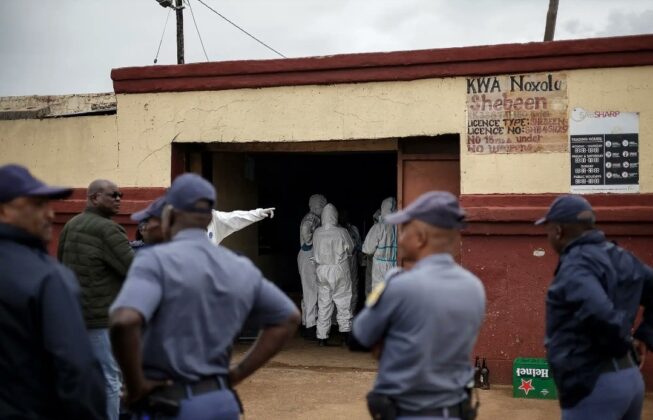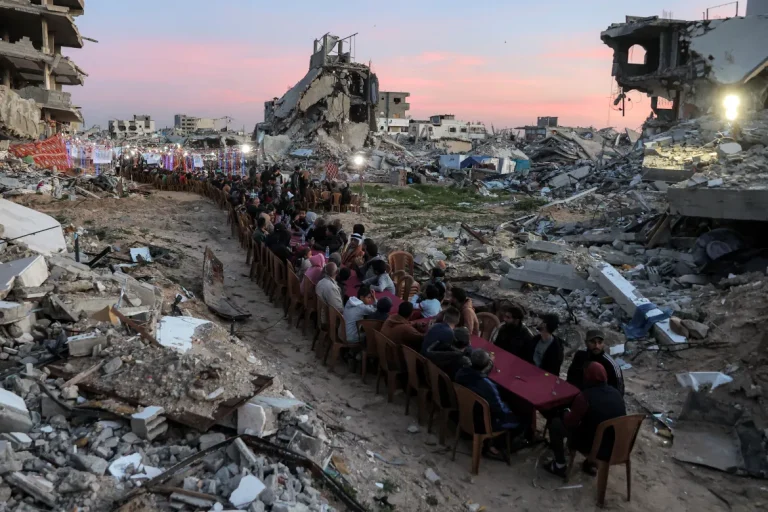Far-right An Israeli group from Tsav 9 blocked trucks carrying humanitarian aid to Gaza near the Karem Shalom crossing. Image: The Boston Globe.
(The Post News)– An Israeli far-right organization, Tsav 9, has blocked trucks containing humanitarian aid to Gaza at the Karem Abu Salem (Kerem Shalom) crossing, in the latest sign of increased tensions over the fragile ceasefire between Israel and Hamas.
In a post on X, Tsav 9 said that members were “currently blocking the way of aid trucks” at several points along the route to the crossing, which is controlled by Israel. Additionally, Tsav 9 said that “Hamas violates the deal and doesn’t return hostages, so aid that enables them to rebuild must be stopped.” Tsav 9 added, “No aid truck will pass until the last dead is returned.”
A video published by Tsav 9 showed members blocking an aid truck from moving. Tsav 9 has disrupted aid deliveries throughout Israel’s Gaza military campaign, staging road blockades and, in some cases, torching aid deliveries, The Times of Israel said.
Meanwhile, Gaza’s Civil Defence reported that an Israeli artillery shelling hit a small bus east of the Kuwait Roundabout in Gaza City’s Zeitoun neighborhood, killing and injuring several people. “At least one boy was rescued alive,” the organization said in a Telegram report. “The fate of the others is unknown due to the danger of the site. Coordination is underway with international organizations to reach the targeted area.”
UN Denounces Tsav 9 and Calls for Lasting Peace
UN High Commissioner for Human Rights Volker Türk urged world leaders to turn the ceasefire into a lasting peace and condemned of Tsav 9. “Human rights are a matter of human dignity,” stated Türk in a social media video. “It is also a matter of accountability for the serious violations of human rights and international humanitarian law that have taken place over the past two years.”
He also added that all Palestinians in the West Bank and Gaza must be included in any future governance, and their right to self-determination must be honored. Israel and Hamas, on the other hand, have blamed each other for violating last week’s ceasefire, aimed at allowing more humanitarian aid into the blockaded Gaza Strip. Despite the agreement, the blockades have continued, and millions of Palestinians lack enough food, fuel, and medical equipment.
Israel said on Thursday that its Rafah border crossing with Egypt would remain closed to individuals until Sunday at least and might be closed to humanitarian convoys. Aid groups argue that opening Rafah is the solution to ending the crisis. “We require more fuel, food, medical supplies, and doctors in Gaza,” said Hanan Balkhy, the World Health Organization’s regional director.
Israel has blamed Hamas for breaking the ceasefire by failing to return all the bodies of deceased hostages. Nine of 28 sets of remains have been returned by Hamas, which says the others are under rubble from Israeli airstrikes. Prime Minister Benjamin Netanyahu said Thursday that Israel would ensure that Hamas releases all the hostages, dead and alive. “The fight is not yet concluded,” he said, promising to achieve all of Israel’s war aims.
Hamas, on its part, held Israel responsible for killing 24 Palestinians since Friday, adding that the incidents violated the ceasefire.
Aid and Accountability
UN officials indicated that more than 200,000 metric tons of aid have been cleared to enter when crossings are reopened, though only limited quantities have thus far entered Gaza.
Aid groups termed Israel’s restrictions as “collective punishment” and warned that famine conditions persist in certain locations. Balkhy of the WHO warned that infectious diseases were “spiraling out of control,” with only 13 of 36 hospitals still partially operational. “Whether it’s meningitis, diarrhea, or respiratory illnesses, we’re talking about a mammoth amount of work,” she said.
The conflict, now in its second year, has killed more than 67,000 Palestinian citizens, according to Gaza’s health ministry. The human toll has seriously damaged Israel’s global reputation, with several Western countries having, over the months, recognized a Palestinian state.
Israeli officials concede in private that they must rebuild diplomatic trust. “This could help Israel regain some of the legitimacy and sympathy it lost during the conflict,” one senior Israeli official said. Former military spokesman Peter Lerner added that for Israel’s reputation to be enhanced would require “a credible commitment to peace, protection of innocent lives, and respect for international law.”
Although the ceasefire affords a fragile lull in fighting, diplomats in the area warn that its success hinges on the restoration of humanitarian access and accountability on both sides.



